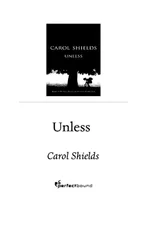Seeing the great cloudy hands made Milly yearn to absolve all those who had troubled her in her life. She forgave her father for naming her Milly instead of Jo Ann, and her mother for passing on to her genes that made her oversensitive to small hurts and slights. She forgave her brother for reading her diary, and her sister for her pretty legs, and her cat for running in front of a truck and winding up pressed flat as a transfer on the road. She forgave everyone who had ever forgotten her birthday and everyone who looked over her shoulder at parties for someone more attractive to talk to. She forgave her boss for being waspish and her lover for lack of empathy and her husband for making uncalled-for remarks about stale breakfast cereal and burned toast.
All this dispensing of absolution emptied Milly out and made her light as air. She had a sensation of floating, of weightlessness, and it seemed to her that bells were chiming inside her head.
But it was only the telephone ringing—without a doubt her father-in-law phoning to ask forgiveness. She hurried inside so she could sing into his ear, yes, yes, yes, yes, yes.
WHEN THE WORLD FIRST STARTED HEATING UP, an international conference was held in Rome to discuss ways of dealing with the situation.
Ian’s small northern country—small in terms of population, that is, not in size—sent him to the meetings as a junior observer, and it was there he met Isobel, who was representing her country as full-fledged delegate. She wore a terrible green dress the first time he saw her, and rather clumsy shoes, but he could see that her neck was slender, her waist narrow and her legs long and brown. For so young a woman, she was astonishingly articulate; in fact, it was her voice more than anything else that he fell in love with—its hills and valleys and its pliant, easy-sided wit. It was a voice that could be distinguished in any gathering, being both sweet and husky and having an edging of contralto merriment that seemed to Ian as rare and fine as a border of gold leaf.
They played truant, missing half the study sessions, the two of them lingering instead over tall, cool drinks in the café they found on the Via Traflori. There, under a cheerful striped canopy, Isobel leaned across a little table and placed long, ribbony Spanish phrases into Ian’s mouth, encouraging and praising him when he got them right. And he, in his somewhat stiff northern voice, gave back the English equivalents: table, chair, glass, cold, hot, money, street, people, mouth. In the evenings, walking in the gardens in front of the institute where the conference was being held, they turned to each other and promised with their eyes, and in two languages as well, to love each other for ever.
The second International Conference was held ten years later. The situation had become grave. One could use the word crisis and not be embarrassed. Ian—by then married to Isobel, who was at home with the children—attended every session, and he listened attentively to the position papers of various physicists, engineers, geographers and linguists from all parts of the world. It was a solemn but distinguished assembly; many eminent men and women took their places at the lectern, including the spidery old Scottish demographer who years earlier had made the first correlation between substrata temperatures and highly verbalized societies. In every case, these speakers presented their concerns with admirable brevity, each word weighted and frugally chosen, and not one of them exceeded the two-minute time limitation. For by now no one really doubted that it was the extravagance and proliferation of language that had caused the temperature of the earth’s crust to rise, and in places-California, Japan, London—to crack open and form long ragged lakes of fire. The evidence was everywhere and it was incontrovertible; thermal maps and measurements, sonar readings, caloric separations, a network of subterranean monitoring systems—all these had reinforced the integrity of the original Scottish theories.
But the delegates, sitting in the plenary session of the second International Conference, were still reluctant to take regulatory action. It was partly a case of heads-in-the-sand; it was—human nature being what it is—partly a matter of political advantage or commercial gain. There lingered, too, a somewhat surprising nostalgia for traditional liberties and for the old verbal order of the world. Discussion at the conference had gone around and around all week, pointless and wasteful, and it looked very much as though the final meeting would end in yet another welter of indecision and deferral. It was at that point that Ian, seated in the front row, rose and requested permission to speak.
He was granted a one-minute slot on the agenda. In fact, he spoke for several minutes, but his eloquence, his sincerity (and no doubt his strong, boyish appearance, his shaggy hair and his blue eyes) seemed to merit an exception. Certainly not one person sitting in that gathering had any wish to stop him.
It was unfortunate, tragic some thought, that a freak failure in the electronic system—only a plug accidentally pulled from its socket—prevented his exact words from being recorded, but those who were present remembered afterward how passionately he pleaded his love for the planet. (In truth—though who could know this?—he was thinking chiefly of his love for Isobel and his two children.)
We are living in a fool’s dream, he told his fellow delegates, and the time has come for us to wake. Voluntary restraints were no longer adequate to preserve the little earth, which was the only home we know. Halfway measures like the old three-hour temps tranquilles were next to useless since they were never, or almost never, enforced. The evening curfew-lingua was ridiculously lenient. Abuses of every sort abounded, particularly the use of highly percussive words or words that were redolent with emotional potency, even though it had been established that these two classes of words were particularly damaging to bedrock and shales. Multilingualism continued to flourish. Wasteful antiphonic structures were actually on the increase in the more heavily populated regions, as was the use of elaborate ceremonial metaphor. It was as though, by refusing to make linguistic sacrifices, the human race had willed its own destruction.
When he finished speaking, the applause was prolonged and powerful. It perhaps held an element of shame, too; this young man had found the courage to say at last what should have been said long before. One after another the delegates rose to their feet, and soon their clapping fell into a steady rhythmic beat that had the effect of holding Ian hostage on the platform. The chairman whispered into his ear, begging him for a few additional words.
He assented. He could not say no. And, in a fever that was remarkably similar to the fever he had suffered as a child during a severe case of measles, or like the fever of love he had succumbed to ten years earlier in Rome, he announced to the audience, holding up a hand for attention, that he would be the first to take a vow of complete silence for the sake of the planet that had fathered him.
Almost at once he regretted his words, but hubris kept him from recanting for the first twenty-four hours and, after that, a kind of stubbornness took over. Isobel met him at the airport with the words, “You went too far.” Later, after a miserable, silent attempt at lovemaking, she said, “I’ll never forgive you.” His children, clamoring to hear about his moment of heroism, poked at him, at his face and chest and arms, as though he were inert. He tried to tell them with his eyes that he was still their father, that he still loved them.
“Leave him alone,” Isobel said sharply. “He might as well be a stranger now. He’s no different than anyone else.”
Читать дальше












